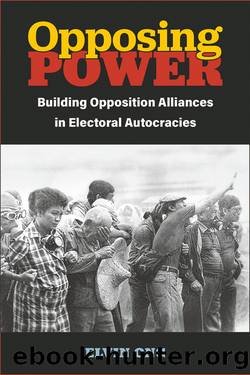Opposing Power by Elvin Ong

Author:Elvin Ong [Ong, Elvin]
Language: eng
Format: epub
Tags: POL054000 POLITICAL SCIENCE / World / Asian, POL007000 POLITICAL SCIENCE / Political Ideologies / Democracy, POL009000 POLITICAL SCIENCE / Comparative Politics
Publisher: University of Michigan Press
Published: 2022-05-17T00:00:00+00:00
The Minor Opposition PartiesâSPP, SDA, NSP, PKMS, RP, and SF
After Chiam See Tong joined SPP in 1996, he undertook systematic effort to try to expand the SPP by forming the Singapore Democratic Page 152 âAlliance (SDA) in 2001 (Loke 2019, chapter 15). The SDA was a coalition of parties that included the SPP, the National Solidarity Party (NSP), the Singapore Justice Party (SJP), and the Singapore Malay National Organization (PKMS). Of these parties, the NSP is the oldest, having been formed in March 1987. While the NSP has contested in every election since its formation, it has never won any electoral districts. Its best results came in the 2001 general elections, when it was part of the SDA coalition. The partyâs secretary-general at that time, Steve Chia, became a non-constituency MP by virtue of losing his contest in Choa Chu Kang SMC by the smallest margin against the PAP.29 The SJP is effectively a shell party, free for any interested person to take over as an institutional vehicle to participate in elections. The PKMS was formed in 1961 originally as the Singapore branch of UMNO.30 After Singaporeâs independence from Malaysia, the party rebranded itself as the PKMS, advocating for the rights of Malay-Muslims in Singapore. Over the decades, the party has struggled to attract members and stay relevant in Singaporeâs valence- and personality-focused electoral environment. In 2010, PKMSâs party members were charged for rioting outside its headquarters in an intraparty struggle for leadership.31 In 2011, its president was arrested, charged, and jailed for possessing and storing contraband cigarettes at its party headquarters.32 As for the SPP, there is scant evidence that the party has developed any coherent party ideology or program. Instead, after Chiam suffered two debilitating strokes and a hip injury, the party passed the leadership baton to Jose Raymond in November 2019, who then quit the party in December 2020.
The other more recent minor opposition parties in Singapore are the Reform Party (RP) and the Singaporeans First Party (SF). Both were formed by opposition elites who had either joined other parties initially but fell out with the party leadership, or had gained some prominence on their own. Kenneth Jeyaretnam is the son of J. B. Jeyaretnam. The elder Jeyaretnam founded the RP in 2008 after he left the WP in 2001. His unfortunate passing just three months later saw his Cambridge-educated son, a hedge fund manager, take over the partyâs leadership in 2009. The SF was set up by Tan Jee Say, a former senior civil servant in 2014, after he left the SDP to contest in the 2011 presidential elections. As a former principal private secretary to former prime minister Goh Chok Tong, Tanâs entry into opposition politics signaled a rare dissent and split from the countryâs hitherto monolithic bureaucratic establishment. But SFâs antiforeigner rhetoric found little traction in local politics. Tan Jee Say dissolved the party in June 2020 and rejoined the SDP.
Table 6.2. Singaporeâs Numerous Political Parties
Download
This site does not store any files on its server. We only index and link to content provided by other sites. Please contact the content providers to delete copyright contents if any and email us, we'll remove relevant links or contents immediately.
Killers of the Flower Moon by David Grann(3231)
Machine Learning at Scale with H2O by Gregory Keys | David Whiting(2281)
Will by Will Smith(2039)
Guns, Germs and Steel by Diamond Jared(1881)
Borders by unknow(1785)
The Room Where It Happened by John Bolton;(1719)
The Color of Law by Richard Rothstein(1574)
Once Upon a Broken Heart by Stephanie Garber(1478)
Water Rights and the Environment in the United States by John Burch(1414)
Friends, Lovers, and the Big Terrible Thing by Matthew Perry(1326)
Examples & Explanations: Administrative Law by William F. Funk & Richard H. Seamon(1325)
A Short History of War by Jeremy Black(1298)
HBR's 10 Must Reads 2022 by Harvard Business Review(1253)
Pharmacy Practice and The Law by Richard Abood(1252)
The Strength In Our Scars by Bianca Sparacino(1239)
That Every Man Be Armed by Stephen P. Halbrook(1236)
The Guarded Gate by Daniel Okrent(1219)
515945210 by Unknown(1206)
Injustices by Ian Millhiser(1198)
